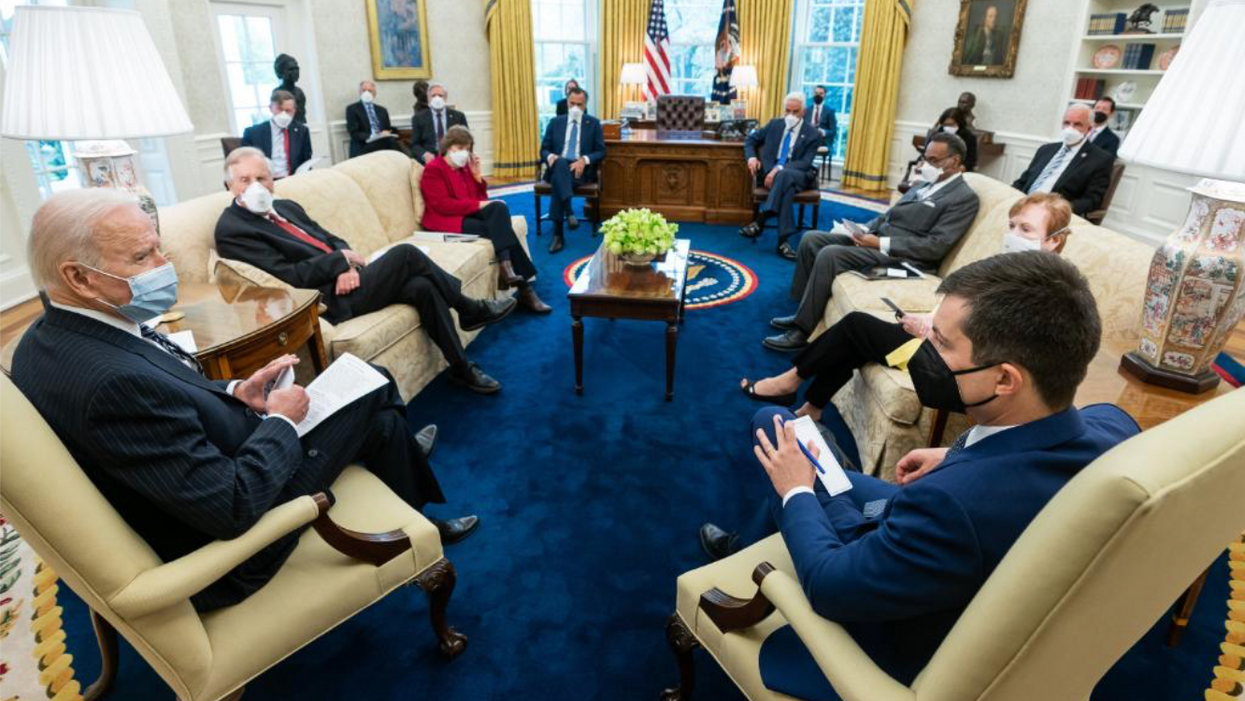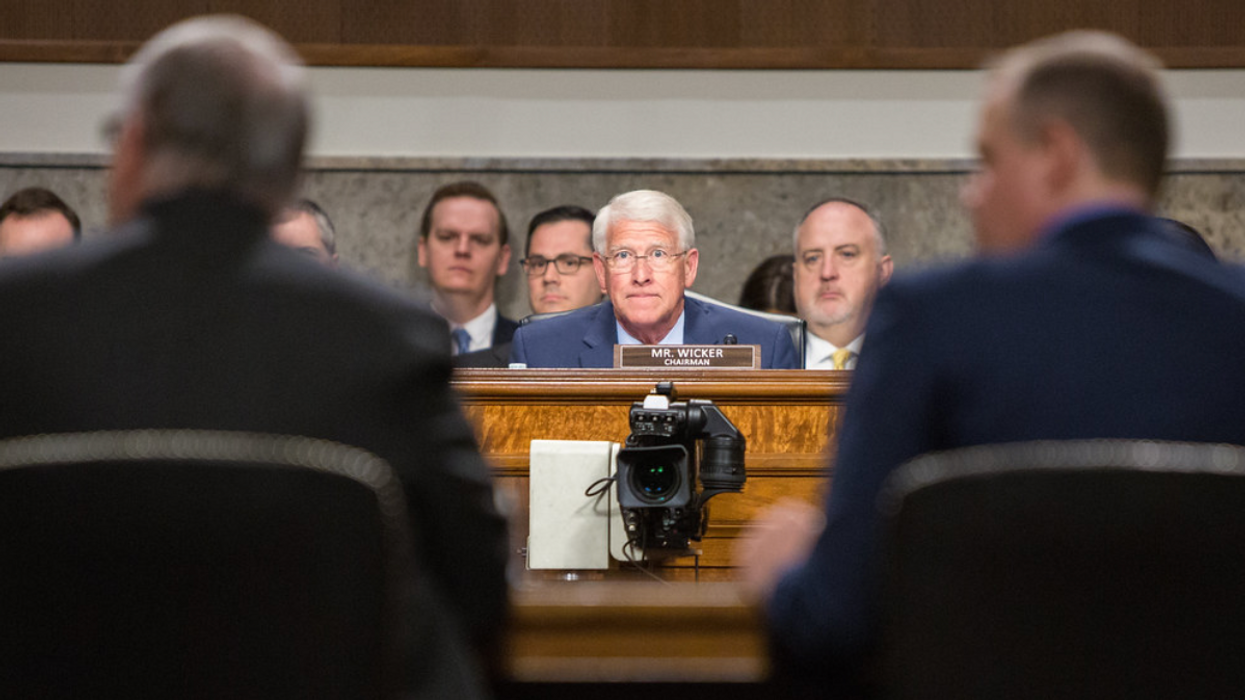The Press Keeps Chasing — And Never Finding — Those ‘Moderate Republicans’
Reprinted with permission from Press Run
Busy pursuing the mythical creature known as the Republican "moderate" — that rare species of conservative who's willing to work with Democrats— the Beltway press recently announced a key sighting. A gaggle of influential "moderates" were willing to work with President Joe Biden to pass a sweeping infrastructure bill.
Those handful of GOP senators include Shelly Capito (R-WV), Patrick Toomey (R-PA), John Barrasso (R-WY), and Roger Wicker (R-MS), and they've been eagerly portrayed in the press as middle-of-the-road deal-makers in search of bipartisan compromise. Slight problem, there's nothing "moderate" about these Republicans, all of whom were Trump loyalists for four years and served as his lapdogs in the Senate. Also, the comically small infrastructure "compromise" they offered up last week was deeply unserious.
This kind of misleading coverage has been a long-running staple of the Beltway media, which loves the idea of "moderate" Republicans stepping forward, in part because journalists have been ceaselessly harping on the idea that all legislation in the Biden era needs to be bipartisan because the Democrat had promised to "unite" the country during the campaign. Also, because the press embraces the narrative that there's a group of thoughtful centrists at the heart of today's GOP — pragmatic do-gooders, happy to occupy the middle ground.
The media bar is set so low for Republicans that apparently the simple act of being willing to discuss a pressing piece of lawmaking with a Democratic White House makes GOP senators "moderates." But are the Republicans actually "moderates"? Do they hold a worldview that places them in the middle of the political spectrum, and do they often work with both sides of the aisle?
No, no, and no. In fact, it's not even close. The so-called moderates spent the last four years voting with Trump 80 and 90 percent of the time. There's nothing centrist about their views, not when they were in bed with the most radical player in modern American politics. Still, the press loves to tell a pleasing tale about Republicans.
Just look at how the press treated Sen. Rob Portman (R-OH) when he announced in February that he's retiring from the Senate. A Republican who served as a reliable rubber stamp during four years of Trump insanity, voting with the White House nearly 90 percent of the time, Portman was lauded in the press at the time of his retirement announcement as being "pragmatic," "serious," and a man who privately bristled at Trump's dangerous behavior.
Yet just days after announcing his looming retirement, and without facing the political pressures of running for re-election, Portman voted to acquit Trump of inciting a deadly insurrectionist mob at the U.S. Capitol, because he said the Senate impeachment trial was "unconstitutional." (It clearly was not.) So that's how "moderate" Rob Portman actually is.
Speaking of impeachment, during Trump's first Senate trial, the New York Times tried to present Rep. Peter King (R-NY), as a "moderate" while he ferociously defended Trump's attempt to help a foreign country interfere with a U.S. election.
If the current infrastructure "compromise" looks familiar, it's because we just saw this same off-base coverage surrounding the Covid relief bill. When ten Republican senators reached out to the Biden White House this winter to discuss a possible compromise on the Democrats' proposed $1.9 trillion Covid-19 relief package, the media quickly identified the players as "moderates," and pushed the idea about a possible bipartisan deal. The Associated Press singled out Rep. John Katko (R-N.Y.) as a key "moderate" who hoped for a bipartisan deal — Katko sided with Trump eight out of ten times in the House.
Over the winter, the Times stressed that, "Moderate Republicans in competitive districts are navigating a careful balance in addressing the coronavirus crisis, eager to put some distance between themselves and a president whose response has been criticized." That's simply not true — not one Republican member of the House voted for Covid relief.
And the "compromise" they offered was laughable, just like the recent GOP "compromise" proposal on infrastructure was laughable. On Covid, the so-called moderates backed a $600 billion relief package, compared to the $1.9 trillion pandemic bill Biden signed into the law. Being the party out of power and urging the president to strip away 70 percent of his Covid and infrastructure bills simply did not represent a sincere negotiating position. And that's why Biden ignores Republican offers. (On infrastructure, Biden wants to spend $2.3 trillion; Republicans are backing a $568 billion proposal.)
But for news consumers, the story presented by the media is that there's an honest back-and-forth negotiation going on, because "moderates" have offered a "compromise." The press constantly plays along with the charade. Weeks ago, Sen. John Cornyn (R., Texas) signaled Republicans would support a comically small $800 billion infrastructure plan, compared to the $2.3 trillion one Biden supports. Yet the Wall Street Journal, among many, treated the offer as being legitimate, claiming the minuscule counter-proposal underscored the "GOP interest in a bipartisan fix for the nation's aging roads and patchy broadband service," and that "Republicans are seeking a compromise on infrastructure."
Spoiler: They're not. A serious, GOP counter-proposal for Biden's $2.3 trillion proposal would be in the $1.6 billion range.
This media trend isn't new. When Jeb Bush ran for president in 2016 and was a contender before the arrival of Trump in the GOP primary field, the campaign press worked overtime positioning him as a "moderate" — a pragmatic label Bush embraced as he eyed a general election against a Democrat. Yet when he served as governor of Florida, the Sunshine State became one of the nation's most pro-gun states, with a variety of laws that lessened restrictions on ownership. After leaving office, Bush remained a far-right politician regardingtaxes, climate change, abortion, repealing Obamacare (it's "clearly a job killer"), civil rights, right-to-die, gun control, relations with Cuba, and legalizing marijuana.
Why on earth was the press touting him as a "moderate" in 2016? Same reason they're scrambling today to describe some Republicans who voted with Trump 95 percent of the time as "moderates." In the hands of the Beltway press, it's become a meaningless compliment.











